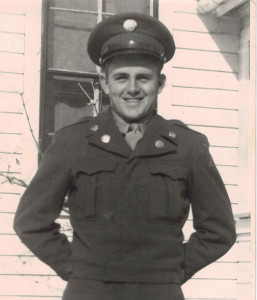Jackson, Sgt Floyd J.R.
 The Department of Defense POW/MIA Accounting Agency (DPAA) announced today that the remains of a U.S. serviceman, missing from the Korean War, have been identified and will be returned to his family for burial with full military honors.
The Department of Defense POW/MIA Accounting Agency (DPAA) announced today that the remains of a U.S. serviceman, missing from the Korean War, have been identified and will be returned to his family for burial with full military honors.
Army Sgt. Floyd J.R. Jackson, 20, of Warrensburg, Mo., will be buried March 7, in Littleton, Colo. In late November 1950, Jackson was assigned to Headquarters Company, 3rd Battalion, 31st Infantry Regiment, 7th Infantry Division, which made up part of the 31st Regimental Combat Team (RCT). The 31st RCT was deployed east of the Chosin Reservoir, North Korea, when it was attacked by overwhelming numbers of Chinese forces. On Nov. 29, 1950, remnants of the 31st RCT, known historically as Task Force Faith, began a fighting withdrawal to more defensible positions near Hagaru-ri, south of the reservoir. On Dec. 12, 1950, Jackson was reported as missing in action.
In late 1953, during a prisoner of war exchange, known as Operation Big Switch, a returning U.S. service member told U.S. debriefers that Jackson was captured by Chinese forces Dec. 12, 1950, and had died Feb. 13, 1951, while in an enemy prisoner of war camp. His remains were not among those returned by communist forces during Operation Glory in 1954.
Between 1991 and 1994, North Korea turned over to the U.S. 208 boxes of human remains believed to contain more than 400 U.S. servicemen who fought during the war. North Korean documents, turned over at that time, indicated that some of the remains were recovered from the area where Jackson was believed to have died.
From 1990 – 2005, U.S. teams excavated sites in the Democratic People’s Republic of Korea (D.P.R.K.), where U.S. servicemen were believed to have been lost during the Korean War. In July 2000, a U.S. team excavated a burial site near Unsan, North Korea, recovering commingled human remains.
To identify Jackson’s remains, scientists from the DPAA and the Armed Forces DNA Identification Laboratory (AFDIL) used circumstantial evidence and two forms of DNA identification tools; including mitochondrial DNA, which matched Jackson’s niece and grand-nephew, and Y-chromosome Short Tandem Repeat DNA (Y-STR) analysis, which matched his nephew. The results of the DNA analysis revealed that Jackson’s remains were among those turned over by North Korea and those excavated near Unsan.
Today, 7,855 Americans remain unaccounted for from the Korean War. Using modern technology, identifications continue to be made from remains that were previously turned over by North Korean officials or recovered by American teams.
For additional information on the Defense Department’s mission to account for Americans, who went missing while serving our country, visit the DPAA website at www.dpaa.mil or call (703) 699-1420.

On November 15th the remains of sgt. Edward J.Martin
came home to Anacoco,Louisiana. he was member of
item Co. 3rd Bn. 31st infantry 7th ID.His remains were
buried November 19th at Michtell cemetery in Anacoco,La.
I’am searching for my first cousin Gerald Charles MacClean Ex-pow. Korean War survivor. He is 20yrs younger than I’am so we have never talked that I can remember. Can anybody help me find him ? His father and my mother were brother and sister. I hope and pray somebody can help me get in touch or some kind of information.
Thankyou. Gregg 208-371-2651